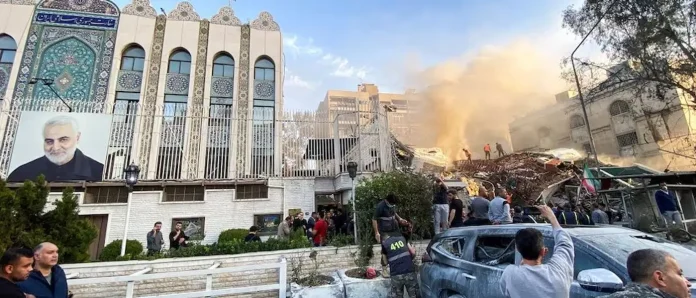Alleged Israeli warplanes targeted the Iranian embassy in Syria on 1 April, killing seven Iranian military advisers, including three senior commanders, Arab media reported.
Syrian Foreign Minister Faisal Mekdad, seen at the site with the interior minister, condemned the bombing.
“We strongly condemn this atrocious terrorist attack that targeted the Iranian consulate building in Damascus and killed a number of innocents.”
Iran’s envoy to Syria stated that the strike hit the consulate building on the embassy grounds. Iran’s Islamic Revolutionary Guard Corps (IRGC) reported that the strike killed seven Iranian military advisers, including Mohammad Reza Zahedi, a senior commander in its Quds Force, an elite foreign reconnaissance and paramilitary arm.
The Israeli military intensified airstrikes in Syria against Iran’s IRGC and the Iranian-backed Lebanese armed group Hezbollah, both of which supported Syrian President Bashar al-Assad.
Iran’s mission to the UN called the strike a “flagrant violation of the United Nations Charter, international law, and the foundational principle of the inviolability of diplomatic and consular premises.” The mission called on the UN Security Council to condemn the attack, arguing that Tehran reserved the right “to take a decisive response.”
“This crime will not pass without the enemy receiving punishment and revenge.”
Muslim countries including Iraq, Jordan, Oman, Pakistan, Qatar, Saudi Arabia and the United Arab Emirates also condemned the attack. Earlier, Iranian Ambassador to Syria Hossein Akbari told Iranian state television that five to seven people, including diplomats, were killed.
Iran’s state media reported that Tehran believed Zahedi was the target of the attack. His deputy and another senior commander were killed along with four others.
US State Department spokesman Matthew Miller stated that Washington remained “concerned about anything that would be escalatory or cause an increase in conflict in the region,” but did not expect the strike to affect negotiations for the release of Israeli hostages held by Hamas.
Jon Alterman of Washington’s CSIS think tank argued that the attack probably reflected Israel’s confidence that such strikes provided deterrents and made escalation of the conflict less, not more, likely.
“The Israelis are convinced that if they seek to hang back, the threat will grow and not diminish. They are persuaded that as long as they do something like this periodically, their adversaries will be deterred.”
